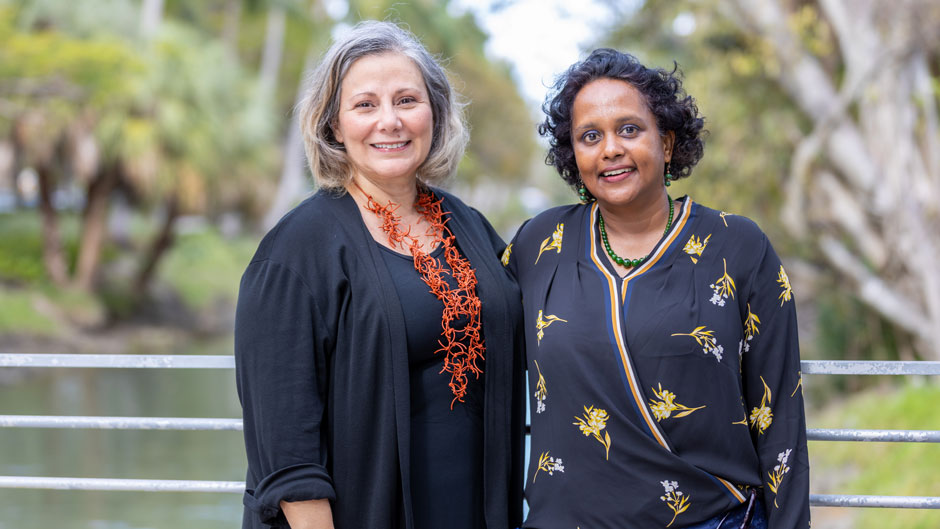The extreme changes in climate that threaten our planet will require changed urban environments and structures that can resist severe weather and that are sustainable and resilient to whatever the future may bring.
It is with this in mind that the University of Miami is offering the new Master of Professional Science in Urban Sustainability and Resilience. The interdisciplinary program offered jointly by the College of Arts and Sciences’ Department of Geography and Regional Studies and the School of Architecture will start in the fall semester..
Shouraseni Roy, professor of the Department of Geography and Regional Studies and Sonia Chao, research associate professor at the School of Architecture, will co-direct the program. Students can choose from two tracks: urban resilience (directed by Chao) and Urban Sustainability (directed by Roy).
Students can select which track they prefer after completing the four required core courses, which include Introduction to Resilient Community Design, Sustainable Cities, Urban Design and Theory, and Urban Management.
“We are excited about the partnership with the college and its potential for setting a model for our efforts in interdisciplinary education. We also welcome a greatly anticipated program that aligns precisely with our strategic priorities and focus on the challenges facing urban environments,” said Rodolphe el-Khoury, dean of the School of Architecture.
The program is open to students from all disciplines who wish to work in jobs—in government, NGOs or private industry—that devote their time to climate mitigation or adaptation issues, such as the role of chief resiliency officers.
“The purpose of this new interdisciplinary master’s-degree program is to help our students understand the way global cities operate and how sustainability is necessary to build and maintain resilient metropolises around the world,” said Leonidas G. Bachas, dean of the College of Arts and Sciences.
“Scientific evidence indicates the globe is warming at an accelerated rate,” Chao reported. “Over the coming decades, such events will increase in frequency and intensity, aggravating existing social and economic stressors, representing a mounting burden on communities, and rendering existing settlements and buildings vulnerable, if not outright untenable,” she added.
“The overall health or even the survival in other instances, of these entire settlements rest upon their versatility and in multifaceted efforts to adapt to climate induced changes in their physical, financial, procedural, and social structures, Chao indicated. “Academia plays a significant role in ensuring students are versed in the tools and expertise needed to tackle climate-induced pressures on built, natural, social, and economic systems, for broad-based community benefit.”
The professors said that the Master of Professional Science (MPS) is one of very few of its kind and they expect that it will become popular with prospective students.
“What better place to study climate change than Miami,” said Chao. “We are the Achilles heel when it comes to climate change. Students do not have to read about red tide or urban flooding. They just have to go to the beach or one of our low-lying barrier island communities and experience it. But, South Florida is also a testing ground of climate action.”
Roy said that such firsthand experience will be important as students explore the various challenges faced by different municipalities. She indicated that the program will teach students how large cities are coping with challenges through courses in urban management and urban design. Students also will take a look at how population growth and other factors can affect city planning, urbanization, and even health.
“We know that there is climate change happening,” said Roy. “What is Miami doing to deal with this? How are other cities addressing the problem?”
Students can select their electives (related to their track) from other University schools and divisions--including the Rosenstiel School of Marine and Atmospheric Science, College of Engineering, Department of Public Health Sciences, business, and so on.
Either a capstone project, an internship, or a design studio project will cap off the MPS program. These projects or internships will also offer practical knowledge of relevant issues in urban areas of South Florida. In some cases, students will work with area resiliency officers who are at the forefront of dealing with climate change issues, Roy indicated.
Visit https://urb.miami.edu/academics/curriculum/index.html for more information on the MPS.
A special information session will be provided for students interested in the Master of Professional Science program on March 5 from noon to 1 p.m. at the Otto G. Richter Library’s third floor conference room. Lunch will be provided.

